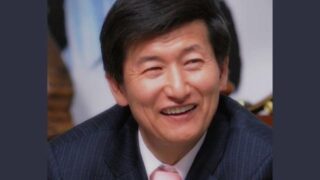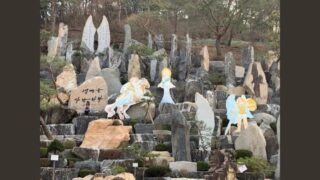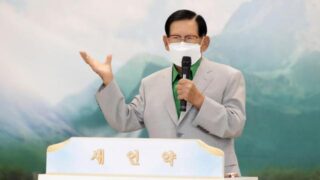While vilified by the media, President Jung’s group expanded in Korea and internationally.
by Massimo Introvigne
Article 2 of 5. Read article 1.


In the first article of this series, we followed the early biography of President Jung Myung Seok, the founder of the South Korean Christian new religious movement Providence, a subject of great interest, controversy, and even surprise, as it managed to continue to grow during the ten years (2008–2018) when Jung served a jail term for alleged sexual abuse.
In the first article, we saw Jung arriving in 1978 with only the equivalent of US $300 in Seoul, where he founded in 1982 his new church, the MS Gospel Association, that will later be called Providence. Jung found some friends among the capital’s Protestant ministers. Despite his limited education, they managed to have him accepted in the Methodist Wesley Theological Seminary, where he obtained a degree in 1983.
Jung toured Korean universities, and gathered a sizeable following among college students. Some of them also went to preach in foreign countries, which allowed Providence to establish its first church abroad in January 1987 in Los Angeles, and in January 1988 the first church in Taiwan, while the movement will grow rapidly, again, mostly among college students. Japan, Australia, and New Zealand are other countries where Providence expanded with some success.
In 1989, Jung started realizing his dream of a “natural temple,” i.e. a temple in the nature without walls but with statues and other sacred artifacts, Wolmyeongdong, built in Jung’s hometown of Seokmak. His followers started calling him “President Jung.”


In the 1990s, while Providence expanded in South Korea and throughout the world, reaching some 70 countries with tens of thousands of members, it was targeted by the highly active Protestant Korean anti-cult movement as “heretic.” The presence of thousands of young women (although there were thousands of young men too) also raised suspicions. Rumors of alleged sexual improprieties with young women started circulating in the late 1980s, and were regarded as believable by French ethnologist Nathalie Luca in her 1994 doctoral dissertation and 1997 French book Le Salut par le foot (Salvation Through Football), following a participating observation in South Korea.
However, she herself reported she had not been personally molested. The few members I interviewed who remember Luca claim that it was not clear to them that she was conducting a participating observation, and indeed she was registered as a “member” of the church. Not unexpectedly, they also strongly disagree with the conclusions of her book.
While Luca’s book had almost no impact in South Korea, a 1999 exposé by the TV network Seoul Broadcasting System (SBS) put the sexual abuse allegations in the national spotlight. Jung left South Korea and preferred to conduct missionary activities abroad only for the next seven years, while the media campaigns continued, until he was arrested in China in 2007, and had to go back to South Korea in 2008, where he was ultimately sentenced to a term of ten years in jail. These events will be discussed in detail in another article of the series.
Remarkably, during the ten years when Jung was in jail, Providence continued to grow, to the astonishment of its critics. He continued to lead the movement from jail. Ms. Kim Ji Seon, who went under the name Jung Jo Eun, was appointed as the “representative disciple,” and delivered to the church the messages written by President Jung while he was abroad and, later, in jail.
When he was released, on February 18, 2018, President Jung returned to Wolmyeongdong and was able again to preside on an expanding church. I attended functions in Wolmyeongdong, Seoul, and Taipei, and interviewed several members, as well as reporters and critics. All confirmed that the attendance at Providence’s gatherings has not diminished during and after Jung’s detention.


Providence does not release statistics, but acknowledges its membership is in the tens of thousands, and this is accepted even by critics. Perhaps 100,000 is a reliable figure, also including all groups outside South Korea.
The formal name of the church is Christian Gospel Mission. Like “Mormon” for the Church of Jesus Christ of Latter-day Saints, or “Quaker” for the Society of Friends, “Providence” was initially used mostly by critics, but is now a common designation of the movement. The church is, or was in its earlier years, sometimes also known as “Jesus Morning Star” (JMS). The same letters JMS are the full initials of President Jung (Jung Myung Seok).
Each country where Providence is present in significant numbers has an autonomously incorporated organization, although an international missionary center at the South Korean headquarters coordinate all of them. The two largest foreign organizations, in Japan and Taiwan, enjoy considerable autonomy. Local churches are led by one or more pastors, who can be male or female. There are seminars preparing pastors in different countries, including South Korea, Taiwan, and Japan.
Some members decide to remain celibate, to be able to devote more time to the church. They are called “stars of faith,” and appears to be at the origin of the media rumors about the so-called “Evergreen,” described as young female members who allegedly vowed to remain chaste. According to Providence, the claim is totally fantastic, the nickname “Evergreen” was never officially used for celibate members, and the “stars of faith” are both male and female.


An Arts Group includes departments devoted to the visual arts, music, dance, design, and fashion. President Jung himself is an accomplished painter, and exhibitions of his work took place in various countries, including during his detention.
Taiwan’s Peace Symphony Orchestra, established in 2013, has performed in several countries and is regarded as the most professional outcome of the movement’s love for music.


The Christian Gospel Mission Volunteer Group performs public services, such as the ecological cleaning of mountains and beaches, and assists the poor and the elderly (not only if they belong to Providence). Given the number of high school and college students in the movement, the Volunteer Group also offers services of school and career orientation.
As other observers have noted since the early days of the movement, the worship services of Providence are rich but somewhat unconventional. College students and others attend Bible studies or clubs, where they will read Jung’s messages, study the lessons, and discuss lively between themselves. Services (some of which I attended) featuring President Jung in Wolmyeongdong include a sermon by him, speeches by other ministers, and a significant amount of music.
Providence recommends that members intermarry with other members and organizes “networking events” where male and female members, including from different regions or countries, can meet each other and eventually decide to date and marry. Providence reports that the divorce rate in these endogamous marriages is less than 1%.
In her 1997 book, whose title translates as “Salvation Through Soccer,” Luca insisted on the ritual nature of the soccer games played within Providence. The French anthropologist was very much fascinated by these games. She explained that Jung’s team “were supposed to always win, but narrowly,” and that matches were often interrupted by philosophical commentaries on the games by Jung himself.


Evaluating Luca’s comments more than twenty years after she published her book is difficult. Jung told me he still plays soccer at age 75, and the central part of the Natural Temple in Wolmyeongdong can be adapted and serve as a soccer field. On the other hand, I saw other sports, such as baseball, volleyball, and basketball, practiced and emphasized not less than soccer in contemporary Providence. The few members who have read Luca’s book (published in French only) disagree not only with her general approach, but with what they believe is an excessive emphasis on soccer, which in their opinion never had such a central role.
On the other hand, Luca’s participant observation dates back to 1990. She mentions the special climate created in South Korea by the Seoul Olympics in 1988, as well as the public financial support available for sport clubs in these years (South Korea had also been selected to host in 2002 the World Cup of soccer, together with Japan). Providence appears to operate, like other new religious movements, through a revolving doors system: members leave, and new members come.
Only a handful of those I were able to interview (including, of course, Jung himself) were there in the early 1990s. At any rate, the role of soccer in the 21st century, perhaps also because of the long detention and the aging of Jung, seems to be quite different from the one described by Luca.
What is important is to understand what kind of theology supports the religious, cultural, and fitness activities of Providence members. This will be the subject of the next articles in the series.








